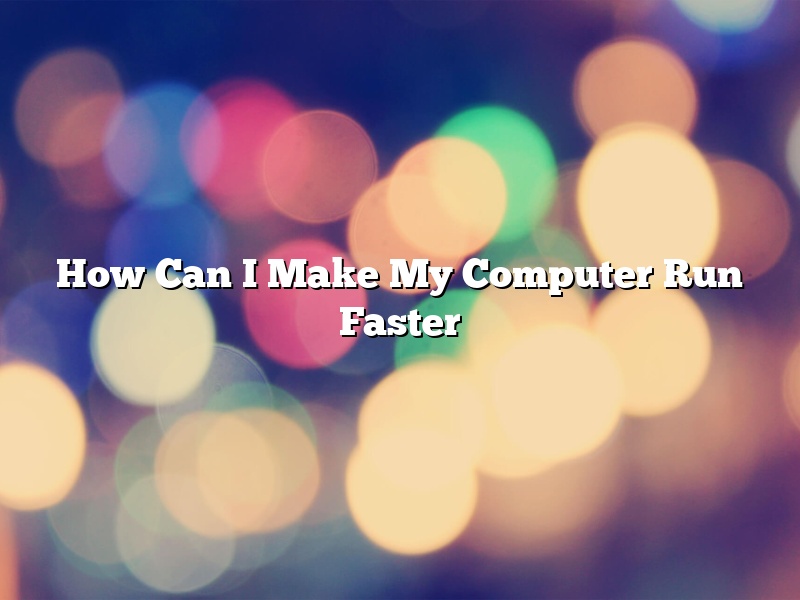One of the most common issues people have with their computers is that they can sometimes be slow to start up or run programs. If you’re experiencing this issue, don’t worry – there are several things you can do to speed up your computer.
One of the simplest ways to make your computer run faster is to reduce the number of programs and processes that are running in the background. Many of these programs and processes are not necessary, and can slow down your computer. To see what programs and processes are running on your computer, open the Task Manager. You can open the Task Manager by pressing Ctrl + Alt + Delete on your keyboard, or by right-clicking the Taskbar and selecting Task Manager.
If you see any programs or processes that you don’t need or want to use, you can right-click them and select End Task. You can also click the Processes tab and select any processes that you want to end. Be careful when ending processes, as some of them may be necessary for your computer to run properly.
Another way to make your computer run faster is to free up some space on your hard drive. If your computer is running out of space, it will naturally run slower. To free up space, you can delete unnecessary files and folders, or move files to an external drive.
You can also improve your computer’s performance by optimizing your settings. To optimize your settings, open the Control Panel and select System and Security. Then, click on System and click the Advanced system settings link.
In the Advanced system settings window, click the Settings button under the Performance section. In the Performance Options window, select the Adjust for best performance option and click the OK button.
You can also improve your computer’s performance by deleting temporary files and browser history. To delete temporary files, open the Control Panel and select Administrative Tools. Then, click on Disk Cleanup.
To delete browser history, open the Control Panel and select Internet Options. In the Internet Options window, click the Delete browsing history… button. Check the boxes next to the items you want to delete and click the Delete button.
Finally, you can improve your computer’s performance by updating your drivers. Drivers are software that allow your computer to communicate with hardware devices, such as printers and scanners. To update your drivers, open the Control Panel and select Device Manager.
In the Device Manager window, expand the list of devices and right-click the device you want to update. Select Update Driver Software… and then select Search automatically for updated driver software. Windows will search for the latest drivers for your device and install them automatically.
If you’re still having problems with your computer’s speed, you can try using a registry cleaner. A registry cleaner is a program that scans your computer’s registry for errors and fixes them. Registry cleaners can be helpful in fixing problems with your computer’s speed, but they should be used with caution.
If you’re not sure how to use a registry cleaner, or if you’re not sure if your computer needs one, you can use a tool like CCleaner. CCleaner is a free program that can be used to clean up your computer’s registry and remove unnecessary files.
These are just a few of the ways that you can make your computer run faster. If you’re still having problems, you can contact your computer’s manufacturer or a computer technician for help.
Contents
How can I make my computer run 100% faster?
There are a few things you can do to make your computer run 100% faster. Here are some tips:
1. Remove unnecessary programs from your computer.
2. Close programs that you are not using.
3. Defragment your hard drive.
4. Disable unnecessary services.
5. Remove unnecessary files from your computer.
6. Upgrade your hardware.
7. Install a faster operating system.
How can I speed up a slow computer?
If your computer is running slowly, there are a few ways you can speed it up. One is to delete programs you don’t use. Another is to clear your computer’s cache. You can also delete temporary files and defragment your hard drive.
How can I make my PC faster for free?
There are many ways that you can make your PC faster for free. In this article, we will discuss some of the most effective methods.
One way to make your PC faster is to defragment your hard drive. To do this, open your Start menu and type “defragment.” This will bring up the Disk Defragmenter program. Click on the disk that you want to defragment and click the Defragment button.
You can also free up disk space on your PC by deleting unnecessary files. To do this, open your Start menu and type “Disk Cleanup.” This will bring up the Disk Cleanup program. Click on the disk that you want to clean up and click the OK button.
You can also improve the performance of your PC by disabling unnecessary programs that start up when you turn on your computer. To do this, open your Start menu and type “msconfig.” This will bring up the System Configuration program. Click on the Startup tab and disable the programs that you don’t need.
You can also improve the performance of your PC by updating your drivers. To do this, open your Start menu and type “Device Manager.” This will bring up the Device Manager program. Click on the device that you want to update and click the Update Driver button.
Finally, you can improve the performance of your PC by clearing your browser’s cache and cookies. To do this, open your browser and click on the Tools menu. Click on the Clear Browsing Data… button and select the items that you want to delete.
How can I speed up my computer in 10 seconds?
There are many ways to speed up your computer. In this article, we will discuss the 10 most effective ways to speed up your computer in 10 seconds or less.
1. Delete temporary files.
Temporary files are created when you open or save a file. They are usually deleted automatically when you close the program, but they can take up a lot of space on your hard drive. To delete them manually, open the Windows Explorer and navigate to the C: drive. Open the Temp folder and delete all the files in it.
2. Delete unnecessary programs.
Many people install programs that they never use. These programs can take up valuable space on your hard drive and slow down your computer. To delete unnecessary programs, open the Control Panel and navigate to the Programs and Features section. Scroll through the list of programs and delete any programs that you don’t need.
3. Defragment your hard drive.
When you save or open a file, the file is scattered across your hard drive. This can slow down your computer. To defragment your hard drive, open the Windows Explorer and navigate to the C: drive. Open the Defragmenter folder and click on the Defragment button.
4. Close unnecessary programs.
When you have a lot of programs open, your computer has to work harder to keep them all running. This can slow down your computer. To close unnecessary programs, click on the Windows Start button and navigate to the Task Manager. Scroll through the list of programs and close any programs that you don’t need.
5. Disable unnecessary startup programs.
Many programs install themselves as startup programs. This means that they run automatically every time you start your computer. This can slow down your computer. To disable unnecessary startup programs, open the Startup folder and delete any programs that you don’t need.
6. Delete your browsing history.
The websites that you visit leave files on your computer. These files can slow down your computer. To delete your browsing history, open the Microsoft Edge browser and click on the Hub icon. Click on the History button and select the Delete button.
Cookies are files that websites use to track your movements on the internet. They can also slow down your computer. To delete your cookies, open the Microsoft Edge browser and click on the Hub icon. Click on the History button and select the Clear browsing data button.
8. Optimize your hard drive.
Your hard drive can become cluttered over time. This can slow down your computer. To optimize your hard drive, open the Windows Explorer and navigate to the C: drive. Open the Disk Optimization folder and click on the Optimize button.
9. Remove unnecessary fonts.
Many people install fonts that they never use. These fonts can take up valuable space on your hard drive and slow down your computer. To remove unnecessary fonts, open the Fonts folder and delete any fonts that you don’t need.
10. Update your drivers.
Out-of-date drivers can slow down your computer. To update your drivers, open the Device Manager and click on the Update driver button.
Why is my PC running so slow?
A slow computer can be one of the most frustrating problems to deal with. When your PC is running slowly, even the simplest tasks can take forever. And, if your computer is really slow, you may not be able to do anything at all.
There are many reasons why your PC might be running slowly. In some cases, the problem is caused by software issues, such as malware or excessive background activity. However, most of the time, the root of the problem is a hardware issue. The most common reasons for a slow PC include:
1. Outdated hardware
2. Low memory
3. Old or corrupt files
4. Too many applications running at once
If your PC is running slowly, the best thing to do is to identify the root of the problem and take steps to fix it. In most cases, this will require you to take your computer to a technician. However, there are a few things you can do to help diagnose and fix the problem yourself.
The first thing to do is to run a scan for malware. Malware is a common cause of PC slowness, and can severely affect your computer’s performance. If you suspect that your PC is infected with malware, you can use a free malware scanner like Malwarebytes to scan your system.
If malware is not the problem, you can try clearing your computer’s memory. To do this, open the Task Manager (Ctrl + Alt + Delete) and click on the “Performance” tab. From there, you can click on the “Memory” header to see how much memory is being used. If the amount of memory being used is close to the maximum amount of memory your PC can hold, you may need to clear some space. You can do this by closing unnecessary applications or by deleting old files.
If the problem is not malware or low memory, it may be caused by old or corrupt files. To check for corrupt files, open the Command Prompt (Ctrl + R, type “cmd” and hit Enter) and type “sfc /scannow”. This command will scan your system for corrupt files and attempt to repair them.
If none of these solutions fix the problem, you may need to take your PC to a technician. In most cases, the issue is caused by a hardware problem, and the technician will need to replace or upgrade the affected component.
Why is my PC so slow?
There are many reasons why your PC may be running slowly. In this article, we will explore some of the most common causes of a slow PC, and offer tips on how to speed it up.
One of the most common reasons for a slow PC is lack of storage space. When your hard drive is full, it can cause your PC to run slowly. One way to free up storage space is to delete old files and programs that you no longer use.
Another common reason for a slow PC is a lack of RAM. When your PC does not have enough RAM, it has to use your hard drive to store data, which can cause your PC to run slowly. You can speed up your PC by adding more RAM.
A third common reason for a slow PC is a virus or malware infection. When your PC is infected with a virus or malware, it can cause your PC to run slowly. You can protect your PC from viruses and malware by installing a good antivirus program and keeping it up-to-date.
Finally, a slow PC can also be caused by old and outdated drivers. When your PC has outdated drivers, it can cause your PC to run slowly. You can speed up your PC by updating your drivers.
If your PC is running slowly, these are some of the things you can do to speed it up. If you are still having problems, you may need to take your PC to a tech support specialist for further assistance.
What is slowing down my computer?
What is slowing down my computer? This is a question that many computer users ask themselves at some point. There are many potential culprits, and often it can be difficult to determine which one is causing the problem. However, by understanding the most common causes of a slow computer, you can take steps to address the issue and speed up your machine.
One of the most common reasons for a slow computer is a lack of available hard drive space. When your computer’s hard drive is full, it has to work harder to find and open files, which can result in a slowdown. If your computer is running slowly, try deleting some of the files you don’t need and freeing up some space.
Another common cause of a slow computer is malware or viruses. These malicious programs can clog up your computer’s processing power and memory, causing it to run slowly. If you think that you may have a virus, you can use a malware removal tool to scan your computer and clean it up.
Another potential cause of a slow computer is old hardware. If your computer is more than a few years old, it may not be able to keep up with the latest software and operating systems. If your computer is feeling especially slow, you may want to consider upgrading your hardware.
Finally, if your computer is running slowly, it may simply be in need of a tune-up. Over time, your computer’s files can become cluttered and fragmented, which can slow it down. You can use a tool like a disk cleaner to clean up your computer’s files and optimize its performance.
If your computer is running slowly, there are many potential causes. By understanding the most common causes, you can take steps to address the issue and speed up your computer.




